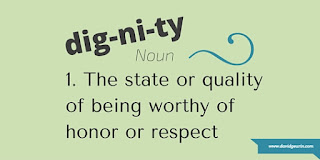What does it truly mean to “honor thy mother and thy father”
as stated in Exodus 20:12? Honor is to regard in high respect or esteem. For a
young child, obeying your parents is a part of honoring them. When a child
listens to, heeds, and submits to his or her parents’ authority, it is honoring
them. However, how do you honor your parents when you become an adult? There
are some people who interpret this verse as a means that children can never
disobey a parent. A child must always do what a parent says even as an adult.
Many will fail to seek the out the meaning in the original language in which
the command was given. I will discuss common misinterpretations of the
commandment as well as the Hebrew word used in the commandment. I will also
discuss how to honor parents who are less than honorable.
According to the Matthew Henry Commentary, to honor thy
mother and thy father is to “esteem them, shown in our conduct; obedience to
their lawful commands.” Essentially, the commentary is stating that children
are to come when they are called, do what you are bidden, refrain from what
they forbid you, and submit to their counsels and corrections. However, is
there a situation in which a child does not need to honor their parents with
obedience? Yes! If a parent ever asks a child to do something which contradicts
God’s law, the child must obey God’s law first rather than his parents. Acts
5:29 states “But Peter and the apostles answered, “We must obey God rather than
men.” In the case of a child disobeying a parent in reverence to God is
Jonathan. His father, King Saul, was determined to kill David, God’s anointed
king of Israel. And Jonathan knew this was wrong and prevented his father from
succeeding (1 Samuel 20:30-34).
In order to examine what God means when He commands that we
honor our parents, we must first look at the Hebrew word in the text. In
Hebrew, the word, kabed, is used in commandment. It is defined as be heavy,
weighty, grievous, hard, rich, glorious, burdensome suggesting a sense of
“giving weight to.” The nuance here is important, according to Walter
Brueggemann, professor at Columbia Theological Seminary, “the command does not
advocate obeying or being subordinate but treating parents with appropriate
seriousness” (ProYouth Pages). According to Rabbi Nachum Amsel, honor is a poor
translation of the word, kabed. The translation should be dignity. Therefore,
we are commanded to dignify our parents and help them keep their dignity.
Dignity is defined as the state or quality of being worthy of honor or respect
and a sense of pride in oneself; self-respect. To maintain a parent’s dignity
is to respect them in a manner which doesn’t diminish their own sense of pride
or self-respect.
We are even commanded to honor parents as adults as well
even when parents act less than honorably. How do we do that? First, honoring
your parents does not mean that you always obey or must tolerate abuse from
them or maintain a close relationship with them. 2 Corinthians 6:14 states “Do
not be yoked together with unbelievers. For what do righteousness and
wickedness have in common? Or what fellowship can light have with darkness?” In
essence, if a close relationship with your parents weighs you down, you do not
need to do so in order to honor them. Second, you must show them simple respect
as your respect. No name calling or mockery. For instances, if you were in a
discussion with your parents and you disagree on the topic. Honoring your
parents would be to say, “I disagree with that statement” and explain why. Not
honoring your parents would be to say “Well, you’re an uninformed moron. You
didn’t go to school so what can you possible say about that.” Third, you are to
still love them. Matthew 5:44-47 states “But I tell you, love your enemies and
pray for those who persecute you, that you may be children of your Father in
heaven. He causes his sun to rise on the evil and the good, and sends rain on
the righteous and the unrighteous. If you love those who love you, what reward
will you get? Are not even the tax collectors doing that? And if you greet only
your own people, what are you doing more than others? Do not even pagans do
that?” Loving those who are unworthy of your love, even as your parents,
carries a far greater reward than loving those who love you.
Therefore, honoring your parents does not mean that you are
under their authority for your entire life. To honor your parents to help
maintain their dignity with respect. To treat them as you would want to be
treated. It doesn’t mean you have to do as they say. You can take their advice
with a little more weight than others or not. Loving someone who is unworthy of
such an emotion is hard. God commands us to do use because the hate doesn’t
hurt the person, it hurts you. It eats at you and hardens your heart. Honoring
your parents is about respect and dignity. Honoring is not calling your
parents’ names or mocking them in anyway. Does that mean you can’t disagree?
No; however, do so respectfully. Parents are given high regard in the Bible and
we should regard them in life too. However, that regard does not mean you have
to grovel at their feet.
Resources:
Amsel, Rabbi Nachum (retrieved 2/2/2017): How to show
respect for a parent: A Jewish View
http://www.myjewishlearning.com/article/how-to-show-respect-for-a-parent-a-jewish-view/
ProYouth Pages (retrieved 2/2/2017): Taking the Fifth:
Common Misuse of the Fifth Commandment
http://www.proyouthpages.com/5thcommandment.html




No comments:
Post a Comment